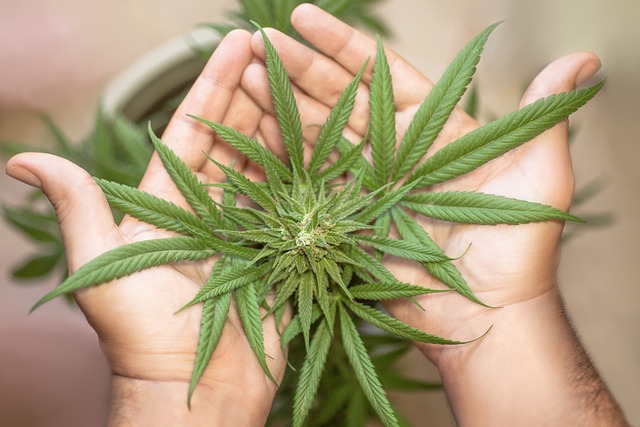In Alaska, where THCA has been legally available for medical purposes since 1998 and for recreational use since 2020, it's crucial to understand that while THCA itself is non-psychoactive, it can decarboxylate into THC, which may cause psychoactive effects or side effects like anxiety, paranoia, and psychotic episodes, particularly at high doses. The substance interacts with various medications, potentially altering their efficacy or causing adverse reactions. Consumers in Alaska must exercise caution due to these interactions and potential side effects. Regulatory bodies actively monitor and study THCA to ensure consumer safety and adherence to state laws. As THCA is legal in Alaska, individuals are encouraged to purchase products responsibly from reputable sources and follow safety guidelines, including not driving or operating heavy machinery under its influence, sticking to recommended dosages, and consulting healthcare professionals for personalized advice, especially if they have pre-existing conditions or are taking other medications. This approach underscores the importance of informed use and the need for ongoing research on cannabinoids like THCA within the legal framework established in Alaska.
Exploring the nuanced effects of THCA flower, a non-psychoactive cannabinoid precursor to THC, this article delves into its side effects and legal status, particularly within the Alaskan context. With THCA’s increasing popularity among those seeking wellness benefits without psychoactive impairment, understanding its implications for safety and potential side effects is paramount. As we navigate the complexities of THCA legality in Alaska, this piece aims to shed light on how residents can responsibly engage with this compound.
- Exploring THCA Flower Side Effects in the Context of Its Legality in Alaska
- Understanding the Implications of THCA Consumption: A Focus on Safety and Side Effects for Alaskan Residents
Exploring THCA Flower Side Effects in the Context of Its Legality in Alaska

In Alaska, where THCA flower has been legally available for medical use since 1998 and fully legalized for recreational use since 2020, understanding the side effects of this cannabinoid is crucial for users. Tetrahydrocannabinolic acid (THCA) is the raw form of THC, the primary psychoactive component found in cannabis. While THCA itself is non-psychoactive, it can convert to THC upon heating or decarboxylation, leading to potential effects. Users may experience side effects such as anxiety, paranoia, or acute psychotic episodes if high doses of THCA flower are consumed and subsequently converted to THC in the body. Additionally, like all cannabinoids, THCA can interact with various medications, affecting their efficacy or causing adverse reactions. It’s important for consumers to be aware of these potential interactions and side effects, especially given the varying degrees of its legal status across different states within the U.S. In Alaska specifically, regulatory bodies continue to study and monitor the effects of THCA flower to ensure consumer safety and compliance with state laws. This diligence in regulation underscores the importance of responsible use and the need for ongoing research into the full spectrum of cannabinoids, including THCA, within the legal framework established by state legislation. Users are encouraged to consult with healthcare professionals for personalized advice, particularly if they have pre-existing health conditions or take other medications that could be affected by the consumption of THCA flower.
Understanding the Implications of THCA Consumption: A Focus on Safety and Side Effects for Alaskan Residents

THCA, or tetrahydrocannabinolic acid, is a non-psychoactive compound found in the cannabis plant that has garnered attention for its potential therapeutic properties. With the legalization of recreational cannabis in Alaska, residents have access to cannabis products that contain THCA, which can be consumed in various forms, including flowers and concentrates. While THCA is a precursor to THC (tetrahydrocannabinol), the psychoactive component of cannabis, it offers a different set of effects and potential health benefits.
Alaskan residents considering THCA flower consumption should be aware of its side effects and safety implications. Common side effects associated with THCA include dry mouth and eyes, mild anxiety in high doses, and possible drowsiness or lethargy. Unlike THC, THCA does not typically induce psychoactive effects; however, it can still interact with the body’s endocannabinoid system, influencing mood, appetite, and pain sensation. It is crucial for users to start with low doses to gauge individual sensitivity and to avoid adverse reactions. Additionally, as THCA legal status in Alaska allows for a broader range of cannabis-related products, consumers should prioritize purchasing from reputable sources to ensure the purity and potency of the product they are using. Safety precautions include not operating heavy machinery or driving under the influence of any cannabinoids, adhering to dosage guidelines, and consulting with a healthcare provider if combining with other medications. Understanding the nuances of THCA consumption is essential for Alaskan residents to navigate its effects responsibly and effectively.
In conclusion, the exploration of THCA flower side effects within the context of its legality in Alaska reveals a complex interplay between consumer safety, regulatory frameworks, and individual experiences. As outlined in our article, understanding the implications of THCA consumption is paramount for Alaskan residents, particularly as its legal status allows for more accessible yet regulated use. It is clear that while THCA may offer potential therapeutic benefits, it is not without its side effects, which can vary among users. Responsible usage and awareness of these effects are essential for ensuring a safe experience. As such, ongoing research and dialogue are critical to further elucidate the nuances of THCA’s impact and to guide informed decision-making within the community. With this knowledge, Alaskans can navigate the legal landscape of THCA with greater understanding and care.
